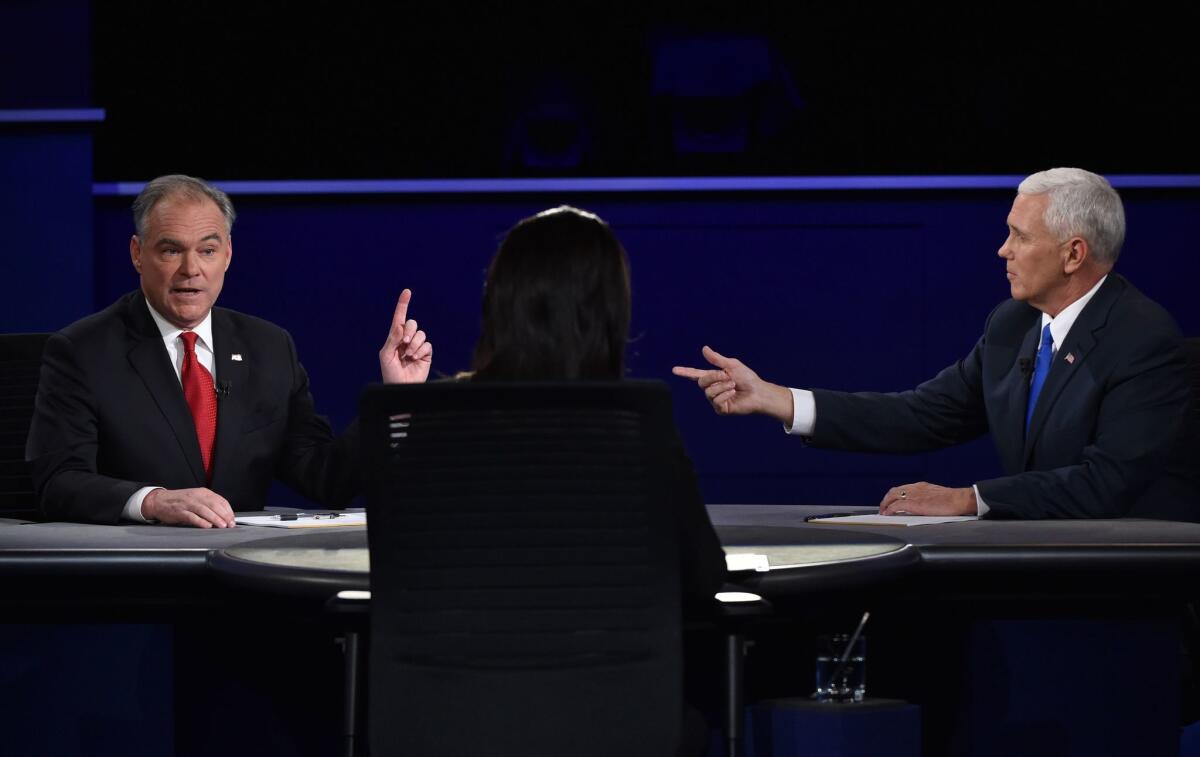‘That Mexican thing’ and interruptions ad nauseam: The most interesting parts of the VP debate that was supposed to be boring

Nobody expected the face-off between vice presidential contenders Mike Pence and Tim Kaine to be a scorcher.
Both Kaine, the Virginia senator running alongside Democrat Hillary Clinton, and Pence, the Indiana governor joining Donald Trump on the Republican ticket, project a demeanor that’s more dad-next-door than street brawler.
But as both running mates mounted their best cases for their tickets, the debate Tuesday in Farmville, Va., generated some interesting moments. Here’s what we’ll remember from their one and only showdown:
Interjections ad nauseam
The cross-talk and interruptions began around 10 minutes into the debate — when Kaine cut into a Pence riff denouncing Clinton's foreign policy — and they seemed to never stop.
The candidates talked over each other and talked over the moderator, CBS News' Elaine Quijano. They pleaded for more time or a chance for a rebuttal.
The feisty tone was driven more by Kaine than Pence; the Democrat was more aggressive in his interjections and at times came off as overeager. Pence, whose smooth delivery harked back to his stint as a conservative radio host, appeared largely unruffled by Kaine's jabs.
The interruptions clearly exasperated Quijano, who at one point admonished both contenders.
"Gentlemen, the people at home cannot understand you when you speak over each other," she reminded them. But the interruptions continued.
There was one notable exception to the cross-talk: a discussion toward the end of the debate on how their personal faith influences their public policy. Both deeply devout men — Kaine a Roman Catholic and Pence an evangelical Christian — they listened wordlessly as their counterpart spoke about how he wrestled with his own faith in pursuing policies related to the death penalty and abortion.
Coming to a campaign ad near you
Kaine frequently sought to put Pence on the spot to defend or answer for comments that his running mate had made. Pence's strategy appeared to be deny, deny, deny.
It was an effective strategy to defuse Kaine's attacks in the debate hall. But it wouldn't be surprising if some of Pence's denials soon appear in a Clinton campaign ad, spliced with Trump saying the very thing Pence denied.
On nuclear weapons, for example, Pence repeatedly brushed off Kaine's accusation that Trump has supported other countries obtaining nuclear weapons. But Trump has backed the idea of South Korea, Japan and Saudi Arabia developing their own nuclear programs to lessen the burden on the United States.
On Russia, Pence similarly changed his tune, calling Putin a "small and bullying leader." Trump has been much rosier in his appraisal of the Russian leader, and so has Pence, who last month called Putin a “stronger leader than Barack Obama.”
'That Mexican thing'
In yet another attempt by Kaine to box Pence in with Trump's words, the Democratic vice presidential nominee repeatedly brought up the inflammatory comments Trump made at the beginning of his campaign when he called some people who immigrated from Mexico "rapists.”
"Senator, you whipped out that Mexican thing again," Pence groaned at one point.
And thus a hashtag was born. #ThatMexicanThing quickly took off on Twitter, with users co-opting the phrase to share their own family histories of immigrants building their lives in America.
Someone quickly claimed the web address “www.thatmexicanthing.com” and redirected it to Clinton's site.
The phrase underscored the Trump-Pence ticket's clumsy Latino voter outreach efforts. Pence repeatedly used the phrase "criminal alien" to describe people who have committed a crime while living in the United States illegally, wording that may not sit well with that slice of voters. In California, for example, the state government recently struck the word "alien" from its labor code because it can be seen as derogatory.
Twitter: @melmason
Get the L.A. Times Politics newsletter
Deeply reported insights into legislation, politics and policy from Sacramento, Washington and beyond. In your inbox three times per week.
You may occasionally receive promotional content from the Los Angeles Times.








